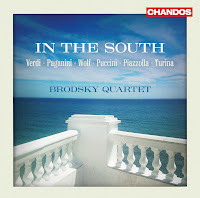The Brodsky Quartet have released ‘In
the South’, a collection of works designed to evoke a sense of sun, passion
and dance. The largest work here, and
central to the disc’s programme is Verdi’s
(1813-1924) Quartetto, his only string quartet, in fact his only extant
chamber composition. Despite the fact
that Verdi rather talked it down, it is a strong work, showing his excellent
command of sonata form, as well as a more expected capacity for melodic
invention, and ends with a triumphant fugal finale. Prior to this, the Brodsky Quartet give us
the Italian Serenade from Hugo Wolf (1860-1903), followed by Puccini’s (1858-1924) touching Cristantemi (Chysanthemums). The Italian Serenade is full of joy and
playful dance, in contrast to the heart-rending sadness of Cristantemi, and
both are performed here with consummate ease.
After the Verdi, we have La
oración del torero (The Toreador’s prayer) by Spanish composer Joaquín Turina (1882-1949), an enjoyable
one movement programmatic work for string quartet, evoking the scene of a
bullfighter praying and receiving the holy sacrament before entering the
bull-ring. Then comes a greatmature
work, Four, for Tango by Astor Piazzolla (1921-1992), originally
written for the Kronos Quartet.
This shows
how far Piazzolla took his own Nuevo Tango,
with extremes of dissonance and rhythmic effect. They end the disc with viola player, Paul Cassidy’s arrangement of two
movements from the 24 Caprices for solo
violin by Nicolò Paganini
(1782-1840). The slow, sixth caprice
is followed by the famous final theme and variations. The arrangements work remarkably well,
although the virtuosity is diluted in the sixth, where the challenging multiple
stopping is spread out between the instruments. However, the range of effects on display in
the finale is great fun, and this finishes off another enjoyable programme from
these great players.
Back in March, I was sent a
wonderful CD of mezzo soprano Clare McCaldin singing music by British composer Stephen McNeff (b.1951) – you can find
a review of this here. On the back
of this, I’ve been listening to a CD of his larger scale orchestral works,
performed by the Bournemouth Symphony Orchestra, conducted by Dominic Wheeler. Between 2005 & 2007, McNeff was composer in residence with the
Bournemouth Symphony Orchestra, during Marin Alsop’s tenure as Principal
Conductor. All four pieces on this CD
were written then, and premièred in Bournemouth. The first work, Sinfonia, is in three movements, with a mysterious opening
(‘Quietly and oddly’), followed by a beautifully warm and lyrical slow movement,
with touches of Copland or even John Adams.
The final movement, ‘Boisterous’ has a real sense of fun, making great
use of the percussion section.
Apparently, the brief for this was to ‘make it lyrical and fun’, which
this definitely is. Heiligenstadt was composed to accompany Beethoven’s Fifth Symphony
in concert, and the title refers to the Heiligenstadt Testament, which
Beethoven wrote at the height of his despair about his deafness. McNeff uses brief, poignant and almost
longing references to various Beethoven songs, which build to a climax, with
jubilant horns claiming victory, before the work subsides into an uneasy close,
almost in preparation for Beethoven’s Fifth to follow. For Weathers,
the BSO are joined by the Bournemouth Symphony Chorus, in a work drawing on the poetry of Thomas
Hardy. Sadly, the CD does not include the words – I
had to look them up, as the words are not always clear from the otherwise
proficient chorus (the text can however be downloaded from the Dutton website here). This is a great
showcase choral work, with some challenging moments for the chorus. It’s good to know that composers such as
McNeff, and notably others such as Jonathan Dove, are still composing ambitious
works for large chorus and orchestra. With
only occasional tuning issues, mainly in the unaccompanied opening and quieter
passages of the fourth section, this is a convincing and dramatic performance,
and McNeff’s imaginative and varied orchestration add to an accessible yet engaging
work. The final work, Secret Destinations, was dedicated to
McNeff’s friend, the poet Charles Causley, who died in 2003, and represents
three places of significance to Causley – the Rocky Mountains, the Basilica in
Assisi, and Eden Rock. Once again,
McNeff’s varied use of the orchestra creates constant interest, particularly
his use of percussion and the brass section.
Overall, a great showcase for a British composer I would definitely like
to hear more from.(These reviews first appeared in GScene, September 2013).



